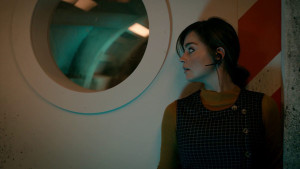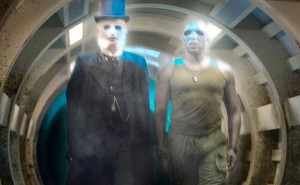Welcome Whovians, to the new incarnation of Who·ology here on Reel World Theology. Unlike the return of Missy to this season of Doctor Who, we have reasons for the regeneration of this weekly feature from podcast to written review, but suffice to say, we still love Who and still plan to bring you our take on it each week to hopefully stir some discussion. So let’s get to it!
See, this is how you do a part one of two. Under the Lake has a classic Who-rror feel with a solid premise that is well paced to keep the suspense up without it feeling forced. There’s not a lot of unnecessary baggage or unexplained frivolity that we saw in the first two episodes of the season. We have the Doctor trying to figure out a spooky mystery with the stakes raised high, and it was a pretty darn good episode.
The Doctor: “Right, I did not expect that. Hands up, who expected that?”
 I always watch the show hoping for the best, but didn’t expect this episode to be as enjoyable as it was. The trailer was perhaps a little underwhelming. I thought it to be a great premise, but as we’ve seen with great premises over the past few years on Doctor Who, they can often end up squandered via messy direction and moffatting of the script. That wasn’t the case with this episode. I loved the pacing, the surrounding characters were decently developed, and the Doctor was at his oddball detective best.
I always watch the show hoping for the best, but didn’t expect this episode to be as enjoyable as it was. The trailer was perhaps a little underwhelming. I thought it to be a great premise, but as we’ve seen with great premises over the past few years on Doctor Who, they can often end up squandered via messy direction and moffatting of the script. That wasn’t the case with this episode. I loved the pacing, the surrounding characters were decently developed, and the Doctor was at his oddball detective best.
Perhaps the most satisfying shift in this season has been the lack of focus on the companion. Clara is still there, but you wouldn’t know it. We aren’t forced to slog through an awkward relationship; we aren’t following her around every episode. The season so far has been about the Doctor. Which is how it should be.
The brief bit of exposition on Clara’s character in this episode does become important. The Doctor expresses his concern to an eager Clara to tread carefully as she desperately seeks adventure, and to not “go local.” He warns her that there can only be one Doctor, an important lesson that most companions have had to learn.
This idea pops up again later in the episode when the Doctor gives a speech to the crew of the base. They’re all discoverers, too curious to run to safety without knowing what’s behind the mystery- just like him. Though he’d much rather they left and get out of his way, he knows they’re going to stay out of their scientific curiosity. Much like Clara, and every companion of the Doctor, he knows that there are consequences to hanging around with him, but he knows they can’t help but hang around anyway. He can’t keep them safe forever, and eventually they will run their course while he remains. There is only one Doctor.
The Doctor: “You live and you die. That’s it. The ghosts are aberrations.”
This episode is all about ghosts- can they exist, and if so, how? This obviously brings up themes that have eternal significance. Here, the Doctor has a very specific view of life and death. It’s funny that he is so specific about this idea, because out of all the people stuck on this base, the Doctor is the only one who doesn’t just live and die. He regenerates. There is only one Doctor.
So what are these ghosts, exactly? According to the episode, they seem to be defined as an essence of a person that is left behind after death. For if you can “hijack” a soul, then it assumes that a soul is some sort of quantifiable thing. But does this indicate that the creators of Doctor Who have a defined eternal belief?
The idea of the afterlife has been played with in the Who-niverse before. In fact, it was explored as recently as the end of last season. We again had the idea of souls being hijacked for some purpose- in that case, to become Cybermen. The afterlife in that scenario was a database. This all indicates that the creators of the show seem to think souls could be some sort of physical frequency with which you can manipulate via technology.
 The Doctor has always had this “you live and die” mentality, and maintains there is no afterlife. He doesn’t waver from that here, though he toys with alternatives. But being the exception to this rule, it begs the question- does the Doctor have a soul?
The Doctor has always had this “you live and die” mentality, and maintains there is no afterlife. He doesn’t waver from that here, though he toys with alternatives. But being the exception to this rule, it begs the question- does the Doctor have a soul?
The Bible puts a lot of emphasis on the soul. Beyond the belief we are souls, it shows us that the soul is how we love fully (“love the Lord your God with all your heart, with all your soul, with all your mind…”- Matthew 22:37), it is how we truly give praise (“Bless the Lord, O my soul, and all that is within me…”- Psalm 103:1) and it is how we count real cost (“For what does it profit a man to gain the whole world and forfeit his soul?”- Mark 8:36) We believe that the soul is everlasting and that life is eternal. This is directly converse to the idea that you live and you die and that’s it. But despite what the Doctor says he believes, his actions tell a different story, and it sheds light on eternality in Doctor Who.
The soul is our true self, our individuality. Does the Doctor have a soul? The Doctor saves people. He sacrifices himself for the sake of others, despite how curmudgeonly he may currently be about it. He does it fully and inherently, like it is a part of himself to give himself for others. We believe there is only one way to truly do that- with all your soul. The Doctor may regenerate but according to the lore of the show he can die. So he’s just like the rest of us individuals. Except, of course, he’s the Doctor. And there is only one Doctor.
Next time on Who-ology: What’s in the box?! Something is sleeping in that hypersleep chamber- is it good or evil? I’m interested to see the origin of the story, though there’s a lot to wrap up in part two. And the Doctor as a ghost? I hope it’s more than a gimmick. It could have fascinating eternal implications.
[youtube url=”https://youtu.be/BSWrOyztTn8″]


Ooh, good question – “Does the Doctor have a soul?” I don’t so much believe that we “have souls” as that we are embodied souls (so Genesis 2.7), with body and soul inseparable. I do think that when we die, we die – but then God gives *new* life (so we will be “spiritual bodies,” as Paul pushes the limits of language in 1 Corinthians 15); there’s nothing inevitable or inherent about it, it’s a miraculous gift. So what with the Doctor’s body changing as much as it has, what implications does that have for his soul? I don’t know – food for thought. I do think that, just because the Doctor says “you live, you die, and that’s it,” doesn’t make it so. For all his regenerations, he’s never really died, “full stop.”
I agree with your positive assessment of the episode as a whole. I haven’t seen much classic Who yet, but I know enough about it to easily see how this feels like it! (If that makes sense.) My only quibble was with Clara (whom I like), who supposedly learned the lesson of “there can only be one Doctor” the hard way last year. I hope we don’t have to “teach her her lesson” again this year.
Yeah I think biblically it shows that we ARE souls, we don’t HAVE souls. I almost used that quote that is often mis-attributed to CS Lewis “You do not have a soul, you are a soul, you have a body” but I couldn’t substantiate the source of the quote and it seemed to simplistic to me.
I think it’s a fascinating thing to consider that he does have a soul, since our worldview would argue he does. I think scripture shows it is the only way you can fully love, praise, or sacrifice. And the Doctor does those things fully at times. It brings up the deeper argument of life existing on other planets. If non human life does exist elsewhere, and it is cognoscentely identical to us, we have to allow for the fact that it too has a soul. Cool stuff. That’s the kind of thought that sci-fi brings up.
I hope Clara does finally learn a lesson. Because they had that idea pop up last season but didn’t follow through. She’s been with the Doctor so long, I really feel like she has to pay the ultimate cost. But I highly doubt Moffatt will allow that to happen.